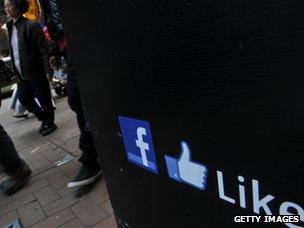Facebook acts on fake ‘likes’
- Published
- comments

"A 'like' that doesn't come from someone truly interested in connecting with a page benefits no one." So begins a blog entry posted by the Facebook security team, external on Friday. It might look a statement of the obvious - but it signals that the social network is finally emerging from its state of denial about the true value of "likes", which have been presented as a valuable currency to advertisers.
Back in July, we questioned the worth of "likes" and asked whether Facebook was awash with questionable accounts which appeared to like just about anything. But the company was dismissive of our Virtual Bagel experiment which had managed to gain 3,000 "likes" for a non-existent business in a few days by placing some adverts. Fake accounts were not a serious problem and getting thousands of dubious "likes" was not the experience of most advertisers, Facebook told us.
But now the message has changed. The security team at the company is warning that it is now acting to remove "likes" on pages that "may have been gained by means that violate our Facebook terms." That includes fans that have been bulk bought by companies - there is a healthy trade in likes as a quick search will show - and others generated by spam accounts or malware.
Our research showed that all sorts of big brands which boast about the millions who have given them the thumbs up appear to be "liked" in rather unlikely parts of the world. And when we looked at some of the "likers" - for my virtual bagels and for some other pages - quite a few of them seemed to be engaged in "liking" everything they saw, with thousands of businesses benefitting from their admiration.
That kind of behaviour - whether genuine or the result of some automated system - is raising questions about Facebook's usefulness as a platform where businesses can engage with consumers. One correspondent put it to me like this:
"What marketing or demographic value does Facebook see in the fact that an 11-year-old girl I know - who is on Facebook, yes - 'likes' American Express? She doesn't even know what it is, and is 10 years from being able to have an American Express card, at the least."
Now, though, Facebook says it will act to remove those questionable "likes" - which would include an 11-year-old girl if the company could work out its users real ages. The social network says that on average less than 1% of "likes" will be removed, and the move will benefit both businesses and users because the system's integrity will be reinforced.
But some brand owners will no doubt wake up to the fact that the love they thought they were getting from Facebook users is not quite as heartfelt as it appeared. And that in turn may make them "like" Facebook's adverts just a little bit less.